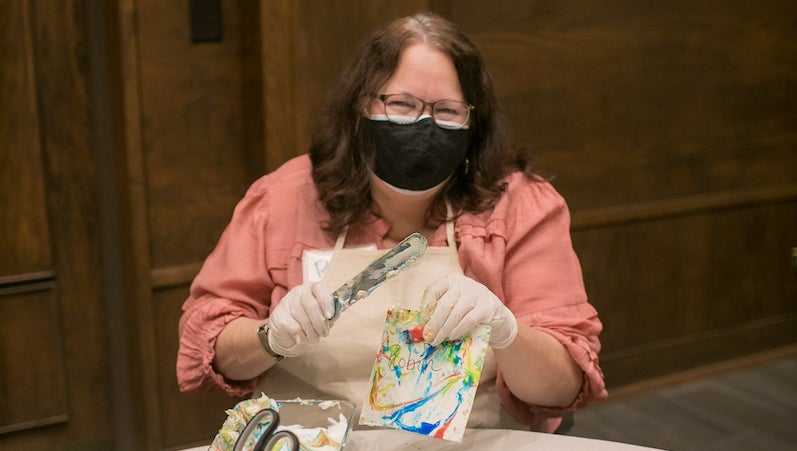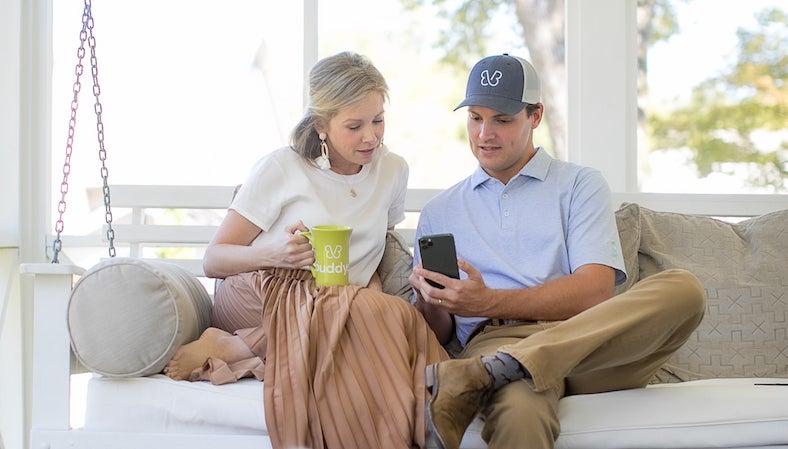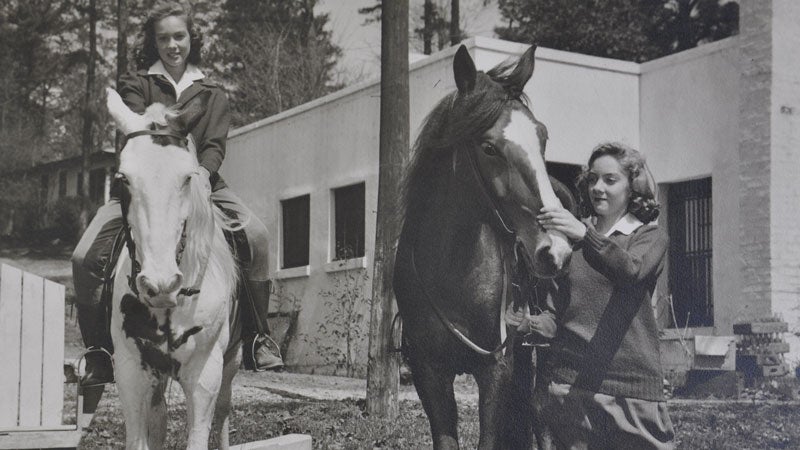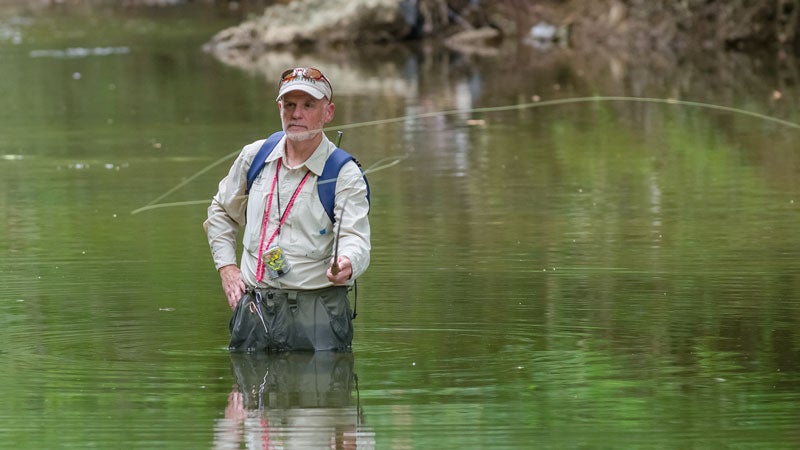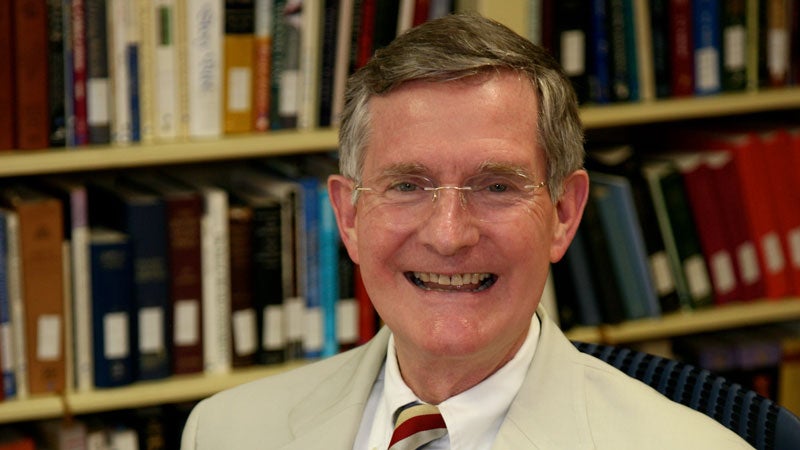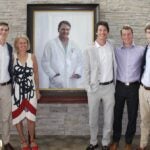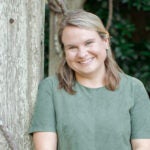By Tracey Rector
Photos by Rebecca Wise & Contributed
On a chilly morning in February, around 20 adults, all wearing masks and keeping social distance from one another, gathered in Graham Hall at Saint Luke’s Episcopal Church. Over the course of an hour, the room buzzed with laughter and fun as friends created artwork with shaving cream, stretched and clapped to Earth, Wind & Fire’s “September,” and played Elvis Presley’s “Love Me Tender” on handchimes.
It was all part of the weekly in-person meeting for the participants and volunteers of Founders Place, a ministry of Saint Luke’s Episcopal Church that provides learning and socialization opportunities for adults with memory loss, as well as support and respite care for their caregivers. And it was no small feat that this group was able to gather on this day.
A year ago, their gathering would have been much larger. On Thursday, March 12 of last year, friends and volunteers started their meeting as usual. But as they enjoyed the fun and fellowship they looked forward to each week, events around the world were changing by the minute with the growing realization of the COVID-19 threat. By the time participants left four hours later, its organizers had typed up a letter announcing it was their last day until further notice.
For Founders Place director Susanna Whitsett, Program Assistant Susie Caffey and the volunteers, the question then became, “What now?”
Pivot, Recreate, Reimagine
When the COVID-pandemic and subsequent lockdown brought virtually everything on the planet to an abrupt halt, it was particularly difficult for people with Alzheimer’s and other dementias and their caregivers. Programs like Founders Place provide much needed opportunities to socialize for patients, who are given space to be themselves in a fun atmosphere that stresses acceptance. They also provide respite for caregivers, who value the opportunity to have a break from the relentless demands of caring for their loved one. The loss of those opportunities meant further isolation for both.
“I don’t want to sugarcoat anything,” says Susanna. “It’s been devastating for many people. We obviously couldn’t operate like we did before, so we had a choice. We could either sit back and wait, or pivot.”
For Susanna, Susie and the ministry’s volunteers, many of whom are retired professionals with years of problem-solving skills under their belt, waiting was simply not an option. Knowing how vital their program was to the mental and emotional health of the participants and caregivers, the team went right to work. “We had to recreate and reimagine,” Susanna says. “It takes patience. Some of our new ideas didn’t really work well initially, so you have to be patient as you discover what does.”
To maintain their sense of connection between participants and caregivers and volunteers, Founders Place reformulated all components of the program within eight weeks. With their new normal of operation, each participant receives a weekly delivery on Mondays with a Connection Kit that includes baked goods, an art project and themed printed materials that help provide what Susanna calls “a scaffolding for the week.” Another day participants gather for large group Zoom calls. On Thursdays, those who feel comfortable meeting in person can participate in a small weekly group at the church. And on Fridays, participants and their caregivers can come pick up lunch—an opportunity to get out of the house and see friendly, familiar faces.
 Zooming Right Along
Zooming Right Along
One of the best surprises of the pandemic for the volunteers became the willingness of the participants to use Zoom video conferencing. “At first, it took our friends a lot of getting used to,” Susanna says. Many people with dementia have spatial awareness issues, and the format was especially challenging for them.
There was a learning curve for the volunteers as well. “We’re all trained on how to interact with people with dementia, but we are not trained on how to act with people with dementia on Zoom,” Susanna says with a laugh. “So we trained ourselves.”
Initially, just getting the call set up and all participants involved would take almost the whole hour. Eventually, though, the caregivers could generally get their loved one set up in place and then leave—to get a shower, to run an errand or to just have a quiet cup of coffee.
And the participants said they love the calls. One caregiver reports that their loved one asks almost every day, “Is today the day for Zoom calls?”
On the day we interviewed musician volunteers and former dementia caregivers Don Wendorf and Lynda Everson, they showed up for our Zoom call wearing Mickey and Minnie Mouse T-shirts and mouse ears. To be fair, they did have a gig lined up later—a Disney sing-a-long with Founders Place friends via Zoom. “A major part of the sing-a-long is the social experience and interaction,” Don says. Lynda adds that it’s a way to “overcome isolation, stay connected and show support. It’s letting people know there is still a community.”
Don, a retired clinical psychologist, stresses the need for self-care for those who take care of family members with memory, and he credits the leadership at Founders Place with being “amazingly resourceful and creative and innovative.” “It was less of a transition and more of an ‘okay, this is the next step,’” he says of the transition when the pandemic began.
All in all, these calls have helped to hold these friends together and have proved that, as outgoing Bishop Kee Sloane of the Episcopal Diocese of Alabama says, “You can teach an old dog new tricks if he needs to learn them!”
 Heart to Heart
Heart to Heart
For caregiver Susanne Wright, being able to continue the friendships formed through Founders Place during the pandemic has been a godsend. Her husband Larry’s dementia diagnosis brought major changes in their lives, but it’s reassuring to her to see aspects of his personality and skills encouraged by the volunteers. “Larry needs to feel useful,” she says. “They are always looking for ways to make him feel useful.”
In these socially distant times, Larry has enjoyed baking treats for the weekly Connection Kits and using his woodworking and gardening skills to help make planters. As for Susanne, she appreciates the weekly virtual support group that also gives her a place to share her experiences, encourage others and connect on a meaningful level with those who understand the frustrations and fears of being a caregiver.
There have been many lessons learned as the folks at Founders Place navigate these new waters of restrictions and health concerns, but Susanna says they’ve become grateful for technology and have developed an even deeper appreciation for the good work they see happening in the lives of their friends with memory loss: “We knew the program was important, but it’s taken the pandemic to show us just how valuable it really is.”
And when and if things get back to normal? “We’re going to sing again!” Susanna says with a laugh. “We won’t take a single note for granted!”
Until then, Founders Place’s mission will continue to be the simple prayer given by one of the participants as they closed recently: “God, we wish we could be hand in hand, but since we can’t we’ll be heart to heart.”
 Respite for All
Respite for All
Founders Place is part of the “Respite for All” network, which includes other local and regional programs for respite care. Susanna Whitsett stresses to those whose loved ones have memory loss that there are a number of programs like Founders Place and encourages caregivers to utilize the many resources available through Alzheimer’s of Central Alabama. Through their website you can access informational videos as well as find lists of adult day care programs and respite care programs in your area. In the Birmingham area, programs similar to Founders Place include Encore at Canterbury United Methodist, Anchor Respite at Asbury United Methodist, Friendship Place at St. Simon Peter Episcopal in Pell City, and CARES (Caring for Adults through Respite, Enrichment and Socialization) through Collat Jewish Family Services of Birmingham. Learn more at alzca.org.

